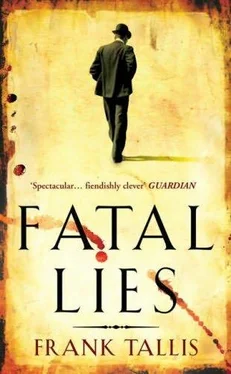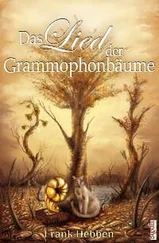Frank Tallis - Fatal Lies
Здесь есть возможность читать онлайн «Frank Tallis - Fatal Lies» весь текст электронной книги совершенно бесплатно (целиком полную версию без сокращений). В некоторых случаях можно слушать аудио, скачать через торрент в формате fb2 и присутствует краткое содержание. Жанр: Исторический детектив, на английском языке. Описание произведения, (предисловие) а так же отзывы посетителей доступны на портале библиотеки ЛибКат.
- Название:Fatal Lies
- Автор:
- Жанр:
- Год:неизвестен
- ISBN:нет данных
- Рейтинг книги:3 / 5. Голосов: 1
-
Избранное:Добавить в избранное
- Отзывы:
-
Ваша оценка:
- 60
- 1
- 2
- 3
- 4
- 5
Fatal Lies: краткое содержание, описание и аннотация
Предлагаем к чтению аннотацию, описание, краткое содержание или предисловие (зависит от того, что написал сам автор книги «Fatal Lies»). Если вы не нашли необходимую информацию о книге — напишите в комментариях, мы постараемся отыскать её.
Fatal Lies — читать онлайн бесплатно полную книгу (весь текст) целиком
Ниже представлен текст книги, разбитый по страницам. Система сохранения места последней прочитанной страницы, позволяет с удобством читать онлайн бесплатно книгу «Fatal Lies», без необходимости каждый раз заново искать на чём Вы остановились. Поставьте закладку, и сможете в любой момент перейти на страницу, на которой закончили чтение.
Интервал:
Закладка:
A man appeared, wearing a smart uniform with orange and gold piping, two rows of buttons bearing relief eagles, and a green hooded cloak. The splendor of his appearance (which revealed the typically Viennese fondness for civic grandeur) vastly inflated the importance of his station and function.
“Herr Dr. Liebermann?” he asked, breathlessly.
“Yes.”
The telegraph messenger handed Liebermann an envelope and retreated a few steps. He lingered in the doorway. Liebermann dug deep into his pockets but could find the makings of only a sorry tip, having disposed of most of his change in the coffeehouse.
Liebermann opened the envelope and found a note inside, written in an elegant, looping hand. Dear Dr. Liebermann,
I trust this note will discover your whereabouts-as I have had to improvise your address. We did not speak of music, but I have a strong feeling that it is important to you-that you possess a musical soul. This evening, I will be performing a selection of Tartini's works for violin. (A ticket is enclosed.) I very much hope that you will come. Please accept my apologies for giving such short notice. Once again, thank you for your most timely assistance. With fond greetings,
Trezska Novak
So that's why she's in Vienna! She's a violinist!
Liebermann raised the note and passed it under his nose. He recognized the woman's perfume: the upper register, a combination of clementine and mimosa, the lower, white amber and musk.
“Trezska Novak.” He said her name out loud, affecting a Hungarian accent. It tripped off his tongue with a jaunty dance rhythm. For the first time that day he smiled. Not a great, radiant smile, but a smile nevertheless.
31
On leaving the hospital, Liebermann walked to Cafe Landtmann, where he ordered a large plate of Wiener schnitzel followed by two slices of topfenstollen. His appetite, which had been notably absent, had suddenly returned. As his fork sliced through the crumbly pastry, the fragrance of lemon zest, cinnamon, and rum intensified. He relished the sharp flavors, which seemed to revive all his senses: the world became more vivid.
By seven o'clock he was on a tram, which took him to the nearby seventh district. He soon found the small concert venue where Trezska was playing. Examining the billboard, he discovered that she was sharing the platform with two other musicians: a pianist, Jozsef Kal-man, and a cellist called Bertalan Szep. The concert seemed to be part of a cultural initiative and was sponsored by Arpad Arts, a charitable foundation promoting young musicians from Hungary.
Liebermann entered the building, deposited his coat in the cloakroom, and purchased a program. He loitered in the foyer for a few minutes and studied the audience. They were entirely unremarkable, although there were more Hungarians present than might ordinarily have been expected. Capturing an usher's attention, he was guided to a central seat in the fourth row. The auditorium was already quite full, and an obese woman, wearing a feather boa and a floral hat, scowled at him when she had to stand up to let him pass.
As he settled down, Liebermann noticed a group of men advancing up the side aisle. They were dressed in elegant black suits and looked, so Liebermann thought, like representatives of the charitable foundation. One of them sported an award of civil merit: a large cross, hanging from a violet and green ribbon-the Royal Hungarian Order of Saint Stephen. Among their number, Liebermann was surprised to glimpse the white tunic and gold sash of an Austrian general. He did not get a very clear view of the man, but he saw that he was carrying a bouquet of flowers. The dignitaries took their seats- all in the front row-and almost immediately the lights dimmed.
A door at the back of the stage opened, and Jozsef Kalman-a thin, sallow man with sunken eyes-marched to the piano. He played some fanciful pieces by Karl Goldmark and a selection of mazurkas, nocturnes, and ballades by Stephen Heller. Liebermann judged Kalman to be technically proficient, but his interpretations were far too literal. Be that as it may, the audience was determined to praise the young artist, and responded with vigorous applause and hearty cries of “Bravo! Bravo!”
The cellist, Bertalan Szep-a stout fellow with comically horripi-lated hair-was an altogether more accomplished performer. He produced an excellent account of Bach's Suite Number Six in D major, managing to make the melancholy voice of his instrument sing with joy. He continued his recital with an amusing transcription of an orchestral interlude by a Russian composer, titled The Flight of the Bumblebee — the conceit of the piece being that its curious chromatic melody emulated precisely the frantic buzzing of the busy insect. When Szep took his bow, Liebermann was pleased to bring his hands together with genuine enthusiasm.
Contemplating the vacant platform, Liebermann found that he was peculiarly excited by the prospect of seeing Trezska Novak again. He began to wonder if his recollection of her was accurate: the full mouth, the strong nose, and those striking eyebrows. She had seemed very beautiful-at the time-but they had met under exceptional circumstances. Perhaps his heightened state of emotion had affected his perception of her. He was hoping-rather anxiously- that his memory had not deceived him, and that the woman who was about to occupy the stage would prove to be an exact copy of the woman he had rescued in Landstrasse.
The door at the rear of the stage opened and Trezska Novak materialized out of the shadows. Liebermann was not disappointed. Indeed, so arresting was her appearance that the audience produced an appreciative soughing that preceded their applause. She was wearing a black satin dress, and her hair fell in thick lustrous locks around her shoulders. Above her heart, she had pinned a brooch-shaped like a horned moon-which burned with a fiery white adamantine light. Her expression was serious and purposeful. She curtsied, gripped the violin beneath her chin, and waited for the clapping to subside. Then, closing her eyes, she drew her bow across the strings.
A strange, improvisatory scraping filled the hall: the opening bars of Tartini's G-minor sonata, more popularly known as The Devil's Trill (on account of the composer's insistence that it was revealed to him by Satan in a dream). The melody was serpentine, sinister, and creeping, occasionally finding a major key and offering the listener hope, only to dash it again by twisting back into a tonal wasteland of eerie ambiguities.
Liebermann had heard The Devil's Trill performed once before, at the Saal Ehrbar, but it had not affected him so deeply. In that concert, the work had been performed with a piano accompaniment, which had only diminished the music's power. The lone voice of the violin was more haunting, more mysterious-imbued with a raw, chilling urgency.
Of course, thought Liebermann. When the devil played to Tartini, he played alone!
Trezska did not open her eyes, but communed with her violin, swaying and rolling from side to side. The demonic obliquity of her eyebrows and the rapture of her playing stirred in Liebermann memories of Faust: a capricious notion that this woman might once have gambled with her soul in exchange for greater mastery of her instrument. The sheer spectacle of her performance charmed the audience into forgiving any technical deficiencies. She was like a magician, artfully misleading by means of a carefully choreographed danse macabre.
The conservative second movement was followed by the opening bars of the third, a fortissimo howl that might have escaped from the mouth of a doomed Florentine in Dante's hell. Jerking rhythms led to fluid accelerandi and savage down-bowed chords. Then the famous trills: frenzied, dizzying, convulsive, becoming louder and louder- climbing in pitch and volume. Trezska leaned backward, and her tresses tumbled off her shoulders. Her eyes opened. In the sulfurous gaslight they appeared incandescent with infernal rage. When the music finally reached its arpeggiated dissolution into nothingness, almost everyone listening had been persuaded that this extraordinary composition was, indeed, the devil's handiwork.
Читать дальшеИнтервал:
Закладка:
Похожие книги на «Fatal Lies»
Представляем Вашему вниманию похожие книги на «Fatal Lies» списком для выбора. Мы отобрали схожую по названию и смыслу литературу в надежде предоставить читателям больше вариантов отыскать новые, интересные, ещё непрочитанные произведения.
Обсуждение, отзывы о книге «Fatal Lies» и просто собственные мнения читателей. Оставьте ваши комментарии, напишите, что Вы думаете о произведении, его смысле или главных героях. Укажите что конкретно понравилось, а что нет, и почему Вы так считаете.












